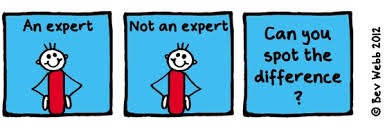
Are you an ‘expert’? I sure hope not.
As consumers, none of us want to make the wrong decision when we’re looking to buy something. None of us want to be the one that bought a Zune.
We like the assurance that third-party confirmation gives as part of the buying process. Maybe we seek out reviews from trusted sources such as specialist magazines, blogs, or websites. Or perhaps we’d let untrusted opinion guide us.
What do I mean by “Untrusted opinion”?
In recent years buyers have grown to trust the phenomenon of the Customer Review, essentially a word-of-mouth recommendation from someone that we don’t know. We often can’t confirm that the submitted information is accurate, or unbiased, yet we allow it to influence our purchasing decision.
Word Of Mouth has been supplemented by Word Of Mouse.
What’s amazing to me is that we often value the opinion of these people over and above the information from more historically-trusted sources. We’d rather believe a total stranger who may not even be real, over a brand’s own content.
Business Expert? There’s No Such Animal
In the world of business – in sales, marketing, finance, HR, and so on – what we’re looking for, consciously or otherwise, is an ‘expert’. Someone who can give us advice based upon what the Merriam-Webster dictionary describes as their “…having, involving, or displaying special skill or knowledge derived from training or experience.”
But in today’s constantly-evolving commercial landscape, how can anyone truly be an “expert”?

Spot The Expert
How can anyone know a subject so intimately, when the subject itself and its place within our decision-making process ebbs and flows with the vagaries of taste and opinion?
Early in my career I was attending a sales training class, where the person giving the training had zero time for anyone who dared to think of themselves as an expert.
He described anyone who considered themselves as an ‘expert’, were actually more likely to be an ‘ex-spurt‘
ex: as in ‘past’. Otherwise known as a has-been.
spurt: A drip under pressure.
If Everyone’s An “Expert”, Then No-One Is
The way that businesses interact with customers thanks to technology-enabled channels such as social media (and whatever else is around the corner) can often mean that what we thought was right today can turn out to be wrong tomorrow.
When I think of someone who calls themselves an ‘expert’, I’m thinking of someone who’s’ “been there and done that”, and can give me advice as a result. But today, “there” and “that” are in a constant state of flux. What’s right today can be wrong tomorrow. How can you call yourself a master of the game if the rules of the game are constantly changing?
As kids we were told “Don’t meet strangers over the internet” and “Don’t get into a stranger’s car.”
Today – thanks to Uber, Lyft, etc – we literally summon strangers via the internet and get into their cars.
The point is that what may have been true yesterday, may not be true today.
To me, today’s expert is the one who knows – and readily admits – that they don’t have all the answers. They’re on a journey, observing and learning as technology-enabled commerce continues to wax and wane. But they’re humble and pragmatic enough to acknowledge that they’re taking that journey along with the rest of us.
Being Afraid To Admit Ignorance
Does that inherently make their advice and opinion less relevant? Not necessarily. In fact, quite the opposite.
By admitting that they don’t have all the answers, and being open to adapting their existing knowledge and experience with whatever the internet has in store for all of us, does more than maintain their credibility. To me, their humility makes them more of trusted source of information than ever before.
I’ve been involving in marketing for the past 25 years. In that time I’ve learned a huge amount. But I’ve also re-learned a ton of stuff too. I’ve had my fingers burned enough times to know that I don’t know it all – and nor does anyone else.
So, do I consider myself a marketing expert?
No, not at all. But I’m still working on it.
ABOUT THE AUTHOR
Gee Ranasinha is CEO and founder of KEXINO. He's been a marketer since the days of 56K modems and AOL CDs, and lectures on marketing and behavioral science at two European business schools. An international speaker at various conferences and events, Gee was noted as one of the top 100 global business influencers by sage.com (those wonderful people who make financial software).
Originally from London, today Gee lives in a world of his own in Strasbourg, France, tolerated by his wife and teenage son.
Find out more about Gee at kexino.com/gee-ranasinha. Follow him on on LinkedIn at linkedin.com/in/ranasinha or Instagram at instagram.com/wearekexino.
Recent articles:
The “Brand vs. Activation” Debate Is a Capital Allocation Failure

How Behavioral Science Thinking Improves Marketing Effectiveness

Dark Social: The Hidden Conversations Marketers Can’t See

Marketing In A Recession: How To Weather The Storm

How To Convince A Marketing Skeptic

Privacy Protection: Why Ad Tracking Must End


